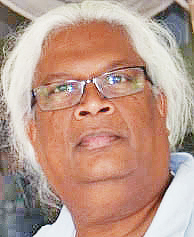Opinions
Ethics? What Ethics?

announcements on immigration, his Bahamas jaunt, his uncritical acceptance of Minister Freeland’s decisions, arms sale to Saudis, position on Ukraine, an arms launderer; his insistence on gender equality and diversity in government is okay, but not in place of talent and justice. It is not Islamophobia to comment on organised Islam’s failures, and its insistence on importing Sharia laws into Canada. If a person or country does something questionable or threatens society, s/he should be cited, whether white or non-white; Christian, Jew, Muslim, Sikh, Hindu, Buddhist or other. Right and wrong in a just society are not negotiable, or modified by political correctness. Diversity is not intrinsically good or bad; it’s something to be managed. So is the Quebec law on facial cover in public services; anyone who has dealt with an unrecognisable individual understands the frustration that propelled Quebec; who knows what’s within a completely occluding costume? Female, or male? Is it fair to ask a tolerant host nation to approve questionable practices e.g. child marriage, female genital mutilation, suppression of women? I chose Canada because of its fair laws and security. I see both being eroded by the PM’s thoughtless effort to accommodate everyone. Help, yes; freedom to roam the country, no.
Business, however, has always been shady or frankly fraudulent, as endless examples of chicanery have shown from time immemorial; it’s the nature of business: greed challenges; honesty is boring. Robber barons were not so named because of public-spiritedness. The stage was set on Jan 1, 1995 for global moral decline when the World Trade Organisation emerged from the ashes of GATT, allowing greedy US business to bleed poor countries further, while failing to lighten the heavy subsidies given to US farmers that made them undersell all competition. The immorality and unfairness of this practice were lost on Americans. Yet, America, Britain and most cultures have always praised ethical heroes who seek justice, like fictional Robin Hood, or today’s whistle-blowers.
By contrast, no one has ever trusted bankers, especially investment types, whose aggressiveness in transactions has often trumped good manners, as TV “dragon”, O’Leary, demonstrates. Bank scams, like money laundering, affect every major country. Recently, India cancelled existing currency notes and replaced them person by person. It is possible that the decline of ethics is not because business has gotten worse, but that it has attracted the wild, the rough-and-ready, the corner-cutter, who sacrifices standards for lucre? Business tempts one to aggrandise; it’s harder to be honest than to cheat. The slick seller easily outwits the crowd, to build a Ponzi scheme. Even prestige MBA programs often encourage students to devise novel profit-making plans, regardless of their ethicality; and professors have praised some that clearly bilk society.
Insider traders invaded even the scrupulous Warren Buffet organisation. Ethics and morality slithered away. Not that they ever really held sway. In my lifetime they went from “reasonably likely” to “unlikely”, from preserved to wilting. Even in a non-MBA milieu, the 1960s UWI – as in myriad offices everywhere – acts of dishonesty were common, from the petty theft of stationery or overstating a travel claim, to major acts like one professor publishing another’s work, or fudging data to prove a favoured hypothesis, gaining recognition and promotion. I’ve seen these, and have been a victim more than once; in Canada, a co-worker erased my name from a definitive paper, which I had written. The University upheld my complaint and asked the perpetrator to mend matters.
Donald Trump slammed Obama for Afghanistan, but he has been bombing it non-stop, seeking to invest in mining, especially tantalum, a rare earth, with shady American and Afghan partners. Who knows what the probes of Robert Mueller, US Justice Department, will reveal? Meanwhile, Chinese merchants illegally harvest Namibian and Guyanese hardwoods, and gold in Guyana and Venezuela; The Hindu newspaper has reported a study showing how values and ethics among students in South India are declining. And Saudi Arabia has just announced that women can attend games!
Regimented start to the school day
 Romeo Kaseram
Romeo Kaseram
We were trained early in our school careers to falling into line following the ringing of the bell. To not obey the bell was to be punished. The first ringing was a warning to get ready for the assembly, like a regiment, our toes touching the drawn white lines in the sun-softened pitch outside our classrooms.
The first ringing of the bell caused the sounds of joyful abandon to come to a dead halt right away. The boys who were running hard in games of hide-and-seek froze in mid-air, their quick intake of breath replaced with the agitation of anxiously arranging tousled hair back into a modicum of presentation fit for the
discerning eyes of the headmaster and teachers. For the other boys, who stooping into the dust and pitching marbles, the first bell caused a mad rush to the community standpipe, where the water flowed constantly since the taps were either too tight to turn into the closed position; or more likely, the tap itself had been stolen overnight. It was here, as the water flowed uninterrupted, where faces were rinsed, and hands washed thoroughly with vigorous rubbing against any coarse, concrete surface. Fingernails with dirt underneath were a well-known, hanging offence, so hands were washed, inspected, and fingers doubly and trebly scrubbed as the five minutes went tick-tock, tick-tock, the countdown to zero on the clock in the headmaster’s office making ready for his second, final ringing of the bell summoning us to our classrooms.
To look out beyond the school’s tall, iron gates was to note with concern classmates who were almost at the threshold of the wire fence, almost with a foot in the door, so to speak, barely ahead as the second bell continued its ringing, rupturing the space between the freedom before school and the formal start to the regimen of the day ahead. The second bell always put longer strides into our classmates who would barely make it inside the safe zone of punctuality, even as the resonance of the ringing rose to prominence, stifling our voices into a resigned silence. So traumatic was the dying of the bell that its finality was at times enough to drive a late student forward, as if prodded from behind with a sharp object, the backbone bent under the tremendous weight of schoolbooks.
So it was we were driven, as so many soldiers, into the daily war of learning. To stand in line in the hot, morning sun, was to undergo the callisthenics and rigour of a workout, preparation for classes ahead which mean loosening up the joints, warming up the legs by jumping in place as a teacher kept metronomic time by whacking a guava rod on a wooden table. With the adrenalin and sweat, we were then put through an act of surrender, as if we were being disarmed before class, the way instructions were shouted to prisoners commanded to throw down their weapons.
“Hands up! Hands down! Hands up! Hands down!” So the rhythm was built, the shouts increasing in volume, the tempo for our obedience ascending into mindless rapidity. We kept up, our hands lifting and falling to the stentorian, militaristic commands. Then came the dreaded instruction, barked out as we breathed rapidly, our arms aching from the lifting, the sweat beading on our foreheads.
“Hands out!” It was time for inspection of the fingernails.
Even as this was underway, the stragglers were working their way into the assembly, breathing hard with the effort of running to the line-up with shoulders compressed, heads bowed, and feet softly treading, the attempt to magically acquire invisibility at the point of entry. But the teachers were always ready to pounce on the latecomer, always ready to teach by example, holding up the tardy to the ridicule of punishing verbal abuse, our laughter forced out in order to drive home the punctuality point.
To undergo the rigour of the fingernail inspection was to endure the strain on the arms brought on by its forced, extended immobility. It meant keeping the arms steady, until the teacher finished walking between the lines of the assembly, doing the close, visual inspection of the extended fingers. To pass the scrutiny was to immediately lower the arms. To fail the inspection was to endure the lecture about personal hygiene, and a call-to-arms to ensure both hands were always thoroughly washed with soap and clean water. Then, in order to remedy the offence, and to instill the lesson in personal hygiene so it was permanently etched not only in the mind, but on the very flesh itself, the offender was made to turn both palms upwards in order to receive the indelible lesson of the lash.
So it was we were inducted into the world of education at the start of each day, our school life a rigorous mix of lessons taught in obedience, fear, and punishment, the final command putting us into the motion of quietly filing in a regimented march into our classrooms, where the wonders of the world were waiting to be opened up to our chastened minds.
